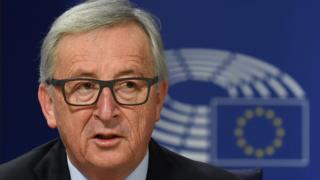 Image copyright
Image copyright
Getty Images
European Commission President Jean-Claude Juncker presenting his paper in Brussels
European Commission President Jean-Claude Juncker has revealed his five future “pathways” for the European Union after Brexit.
His white paper looks at various options, from becoming no more than a single market to forging even closer political, social and economic ties.
The 27 leaders of EU countries will discuss the plans, without Britain, at a summit in Rome later this month.
The meeting will mark the EU’s 60th anniversary.
Germany’s foreign minister, Sigmar Gabriel, has already responded to dismiss the idea of the EU purely being a single market.
Path one: ‘Carrying on’
The remaining 27 members stick on the current course, continuing to focus on reforms, jobs, growth and investment.
There is only “incremental progress” on strengthening the single currency.
Citizens’ rights derived from EU law are upheld.
Path two: ‘Nothing but the single market’
The single market becomes the EU’s focus.
Plans to work more on migration, security or defence are shelved. The report says this could lead to more checks of people at national borders.
Image copyright
Getty Images
German Chancellor Angela Merkel (l) and British Prime Minister Theresa May (r) have clashed over the future of the single market
Regulation would be reduced but this could create a “race to the bottom” as standards slip, it says.
It becomes difficult to agree new common rules on the mobility of workers, so free movement of workers and services is not fully guaranteed.
Path three: ‘Those who want to do more’
If member countries want to work more with others, they can.
Willing groups of states can form coalitions on key areas, such as defence, internal security, taxation and justice.
Relations with outside countries, including trade negotiations, remain managed at EU level on behalf of all member states.
Path four: ‘Doing less, more effectively’
The EU focuses on a reduced agenda where it can deliver clear benefits: technological innovation, trade, security, immigration, borders and defence.
It leaves other areas – regional development, health, employment, social policy – to member states’ own governments.
Image copyright
Getty Images
An EU agency would manage all borders surrounding the union, including this one between Bulgaria and Turkey
EU agencies tackle counter-terrorism work, asylum claims and border control. Joint defence capacities are established.
The report says all this would make a simplified, less ambitious EU.
Path five: ‘Doing much more together’
Feeling unable to meet the today’s challenges alone or as part of the existing group, EU members agree to expand the union’s role.
Members agree “to share more power, resources and decision-making across the board”.
The single currency is made central to the project, and EU law has a much larger role.
Image copyright
Getty Images
Path five would promote the euro as beneficial for all, including troubled Greece (pictured)
Several European “Silicon Valleys” would emerge, says the report.
Decisions and action would be taken more quickly, but, the paper warns, “there is the risk of alienating parts of society which feel that the EU lacks legitimacy or has taken too much power away from national authorities”.
The view from Brussels, by the BBC’s Kevin Connolly
Jean-Claude Juncker clearly doesn’t want the over-riding memory of the Treaty anniversary to be the fact that the European Union has contracted for the first time after expanding steadily since 1957.
The absence of the 28th member state, the UK, will provide a sharp reminder of just how long a shadow Brexit now casts over EU proceedings.
However, in his five possible scenarios, Mr Juncker hasn’t provided any grand sweeping vision of the future. After the shock of Brexit and amid signs of a spasm of populism in France, the Netherlands and elsewhere, few would have been in the mood for one.
After Brexit: Jean-Claude Juncker sets five paths for EU’s future}

